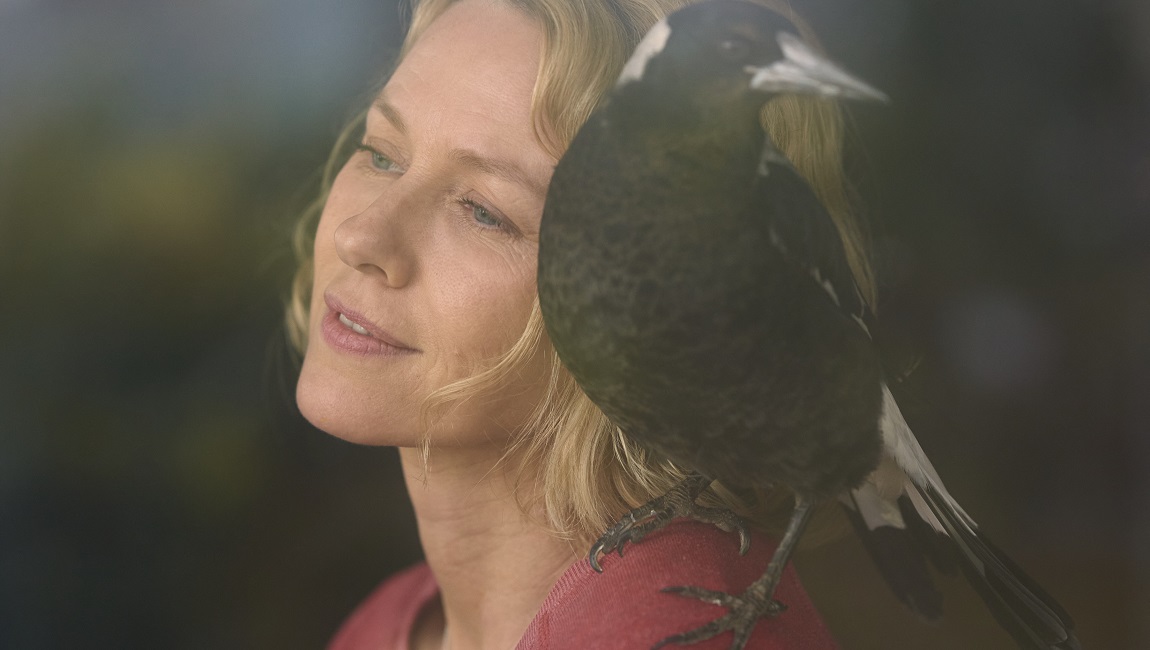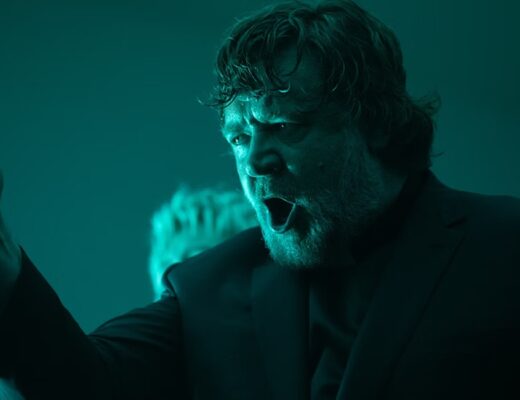Penguin Bloom tries to expand itself a bit from template filmmaking, but mostly still trades in familiar disability narrative tropes and obvious metaphors.
Regrettably, there is no penguin in Penguin Bloom. Instead, the title refers to an injured magpie adopted by the sons of the Bloom family, an Australian brood in crisis after Naomi Watts’ Sam, the mother, fell off a roof in Thailand and was paralyzed from the waist down. Once an adventurous surfer, Sam finds herself bound to a wheelchair, drained of the joie de vivre she once possessed and struggling to find a way forward. One of the boys says the magpie is named Penguin because of her black and white feathers, but we can assume it’s also because the poor bird has been rendered flightless. See where this is going? Were it an actual penguin, flightless by nature, the developing bond between Sam and the bird wouldn’t be quite so heavy with meaning, and the little magpie’s journey back to the skies would not inspire Sam to pull herself out of misery and into a new, happy way of living.
If that all sounds overly precious and contrived — Penguin Bloom is something of a template for the type of films that snugly fits under a Netflix recommendation subheading that reads “Inspirational Stories Involving Motherhood and Animals” — the film also ends with images of the real Bloom family and their very real magpie, so you don’t think the filmmakers made this all up just for the tidy metaphor. But knowing the film’s basis comes from a memoir by Cameron Bloom, Sam’s husband, does impart some insight into the film’s point of view. Try as director Glendyn Ivin might to make Sam’s own interiority the film’s focal point, attempted through plenty of close ups and daydreams, Sam is just as often seen through the eyes of her husband and children, especially Noah, her oldest, whose narration frames the entire thing. Of course, the adjustments Sam’s family must contend with are difficult and should be treated with empathy, but while they are wrought with emotional complexity and genuine depth, Sam’s arc remains rather simplistic, developed almost entirely through her family encouraging her and her friendship with a bird, and in this way the film can occasionally seem hostile to Sam. In one scene, the camera even resorts to something close to gawking, as Noah spies on his father helping his mother use the toilet, the camera lingering on the scar on her back.
For roughly the first half of the film, Sam sulks and rages against her situation, acting out by knocking over household objects and refusing to spend time with her family. But once her new friend Penguin Bloom stretches her wings and finally flies, Sam is suddenly changed, overcome by epiphany and ready to get back to the business of living, taking up kayaking and smiling for the first time in forever, nudged along by her husband and children. It is thuddingly obvious storytelling wrapped in ostentatious filmmaking that prioritizes lens flare and the wide open vistas of a daydream over any nuance and sensitivity. Whether Penguin Bloom has particular insight as regards its specific portrayal of disability is something that may not be immediately apparent to able-bodied viewers (including this critic), and so if it somehow finds its way out of the depths of Netflix and into the public consciousness, someone with more insight and experience might be better situated take it to task or even praise it for what is lost on those of us ignorant to such circumstantial nuance. What is obvious, however, is that none of this pro forma storytelling is new or especially complicated. Penguin Bloom isn’t much more than a collection of bog standard disability narrative tropes filtered partially through the lenses of the people surrounding the person affected, a welcome and necessary wrinkle to be sure, but one which doesn’t much change the film’s final shape.
You can currently stream Glendyn Ivin’s Penguin Bloom on Netflix.







